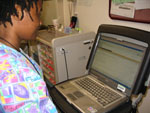COWs find greener pastures in hospital rooms
by
George SpainIS Technical Publisher
All right, so they’re not really the cud chewing, grass burners that hang around the farm and give milk. They’re Computers On Wheels (COWs) and they’ve found green pastures in the hospital as a way to let caregivers graze on patient information they need quickly and accurately.
The COWs are streamlined platforms made by Stinger Industries that cart around Dell laptop computers wirelessly connected to various patient information databases. The combination of a flexible cart with a very small footprint and a powerful, wireless computer allows the COW access to a patient’s bedside where caregivers can directly enter and retrieve patient information.
 Clinical associate
Wilfrida Noelsaint checks on patient information using the COW on 8
East.
Clinical associate
Wilfrida Noelsaint checks on patient information using the COW on 8
East.Nurses can enter an immediate admission assessment by typing responses from the patient directly in to the database.
Nurse managers Bonnie Foulois (8-East) and Barbara Burke (10-West) are enthusiastic about the COWs and their impact on patient care.
“They go into the rooms with patients and it’s ‘click as you talk’, for taking patient history,” Foulois said. “And they’re great for patient education; you can pull up information relating to the patient’s diagnosis.”
“This really helps with repeat admissions,” Burke said. “These are patients who for one reason or another have to return to the hospital every few weeks. Each time the patient returns, we’d take a new set of notes, asking the same questions.”
Now, she says, the history is available on the computer when a patient returns, making follow-through easier and reducing redundant paperwork.
“These computers save us a least an hour a day,” said Burke.
“They also allow us to share the information with other caregivers,” said Foulois. “For example, if a patient comes in for one ailment, but is also a diabetic, then the information can be transmitted to dieticians and other specialists.”
Both mentioned that one of the best features of the COWs is legibility. Notes written by hand can be difficult to read. Notes entered from the bedside or gathered from the patient history can not only be read on the screen, but can be printed to hard copy by wireless connection.
The COWs were well researched. There were several vendors who competed to provide the service. The steering committee included Foulois, Burke, and Clinical Services administration’s Marilyn Schaffner and Michael Irving, Information Services’ Deb Campbell, Mark Daniels, and Dave Northrup.
The team was most impressed with the implementation in the McLeod health care facility in Florence, where they saw the Stinger Industries models in action.
The COWs are about $3,000, including cart and computer. However, buying the components was only a small part of getting the project rolling.
Wireless infrastructure was not uniformly distributed in the hospital. In order for the COWs to be effective, infrastructure support had to completely cover the hospital, eliminating “dead zones” of connectivity. This was accomplished with the support of the Office of the CIO.
While there may be a few slow reception issues during certain times of the day, the COWs are producing and are expected to do more in the future. Eventually, the team hopes to add ID Scanners so that the information on an ID wrist bracelet will be able to bring up a patient’s entire history. More COWs are planned for later this year in the main hospital.
Friday, April 22, 2005
Catalyst Online is published weekly,
updated
as needed and improved from time to time by the MUSC Office of Public
Relations
for the faculty, employees and students of the Medical University of
South
Carolina. Catalyst Online editor, Kim Draughn, can be reached at
792-4107
or by email, catalyst@musc.edu. Editorial copy can be submitted to
Catalyst
Online and to The Catalyst in print by fax, 792-6723, or by email to
petersnd@musc.edu
or catalyst@musc.edu. To place an ad in The Catalyst hardcopy, call
Community
Press at 849-1778.